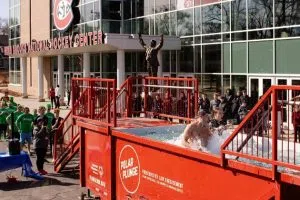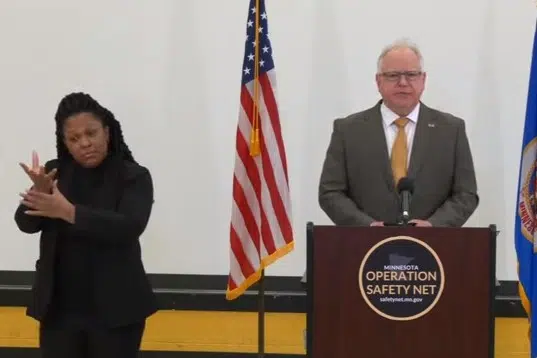(KNSI) – After days of protests surrounding the fatal police shooting of 20-year-old Daunte Wright in Brooklyn Center that intersected with the Derek Chauvin trial coming to a close, Gov. Tim Walz on Monday requested law enforcement assistance through the Emergency Management Assistant Compact.
With the onus of whether or not to convict Chauvin in the death of George Floyd now on the jury after closing arguments wrapped up Monday, Walz said the state needs support in its efforts to preserve the constitutional right to peaceful protest while also ensuring public safety.
“I am grateful to our colleagues in Ohio and Nebraska for their willingness to provide assistance and relief to our State troopers and law enforcement officers as they continue to work to keep the peace in our communities,” Walz said.
Chief of the Minnesota State Patrol Col. Matt Langer says 128 members of the Ohio State Highway Patrol and the Nebraska State Patrol will come to Minnesota for “additional surge capacity.”
The Minnesota State Patrol was issued a temporary restraining order over the weekend that says officers cannot arrest or use force or chemical agents against news media members covering protests. Langer clarified that though the state patrol will train the Ohio and Nebraska personnel, they are not subject to that restraining order since they do not work for the Minnesota State Patrol.
During an Operation Safety Net press conference Monday, Minneapolis Police Department Chief Medaria Arradondo says he and other Operation Safety Net leaders have listened to community members, activists and elected officials.
“Operation Safety Net is not about arresting people,” Arradondo said. “We want peaceful assembly, we want peaceful protests. We know that we have a city that is in mourning, that they’re in grief. The last thing we want to do is turn this into a enforcement [sic] situation.”
Brooklyn Center leaders, including Mayor Mike Elliot, condemned outside law enforcement’s use of force during protests in the city. Though the city passed a resolution that banned Brooklyn Center officers from using tear gas, police lines and chokeholds, that resolution does not bind other agencies.
Arradondo highlighted the focus of Operation Safety Net going forward: de-escalation.
“If you may recall the last couple of nights … there were no arrests, there was no gas having to be used,” Arradondo said. “That was laid upon, once again, not only our readjustment in terms of Operation Safety Net, but what the community was informing us that would work better.”
Though Arradondo says the top goal of Operation Safety Net is de-escalation, law enforcement still can use less-lethal munitions.
During the press conference, Arradondo and Langer attempted to drive a wedge between law enforcement’s actions during protests last week and Operation Safety Net’s next steps, contradicting statements the two made last Monday. Arradondo said on April 12th — one day after Wright’s death — that Operation Safety Net was then moving into Phase 3 earlier than anticipated. That step, which involved moving more law enforcement personnel and Minnesota National Guard members into duty, wasn’t expected until the Chauvin trial jury started deliberating. Though authorities said Phase 3 was in effect last week, Langer called the unrest over Wright’s death and the ensuing police response “not Operation Safety Net.”
“Operation Safety Net moves into Phase 3 today,” Langer said. “But what started on Sunday with the trafic death of Daunte Wright led us as a coalition and a community and a state into crisis mode. That was not Operation Safety Net.”
On the day after Wright’s shooting by former Brooklyn Center police officer Kim Potter — who has since been charged with second-degree manslaughter — Langer had said Phase 3 was already in place, which contradicts his statements made on Monday.
“Our plan was to get to Phase 3 of the Operation Safety Net plan about the time of closing arguments, and yesterday’s incident in Brooklyn Center triggered the need to move faster into Phase 3 for reasons that are similar but different at the same time from what happened with their planning effort on Operation Safety Net,” Langer said April 12th, adding that the Minnesota State Patrol had deployed all of its Phase 3 resources the prior evening.
Walz is expected to hold a press conference with Minneapolis Mayor Jacob Frey, St. Paul Mayor Melvin Carter and Department of Public Safety Commissioner John Harrington at 5 p.m. Monday addressing the EMAC assistance request.










